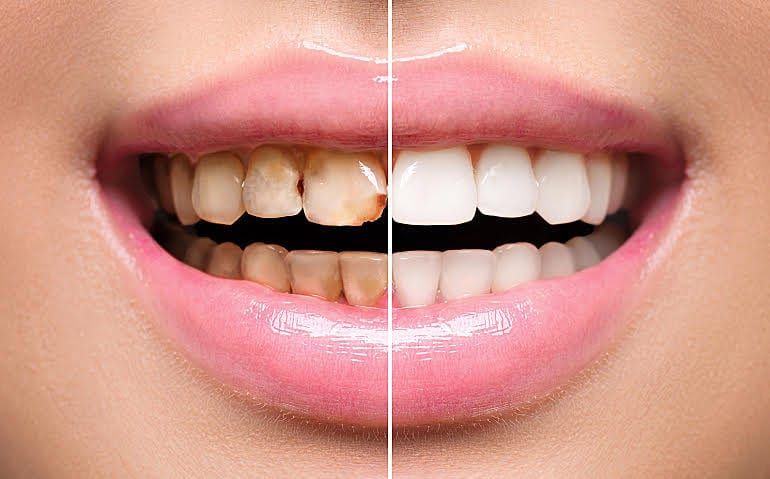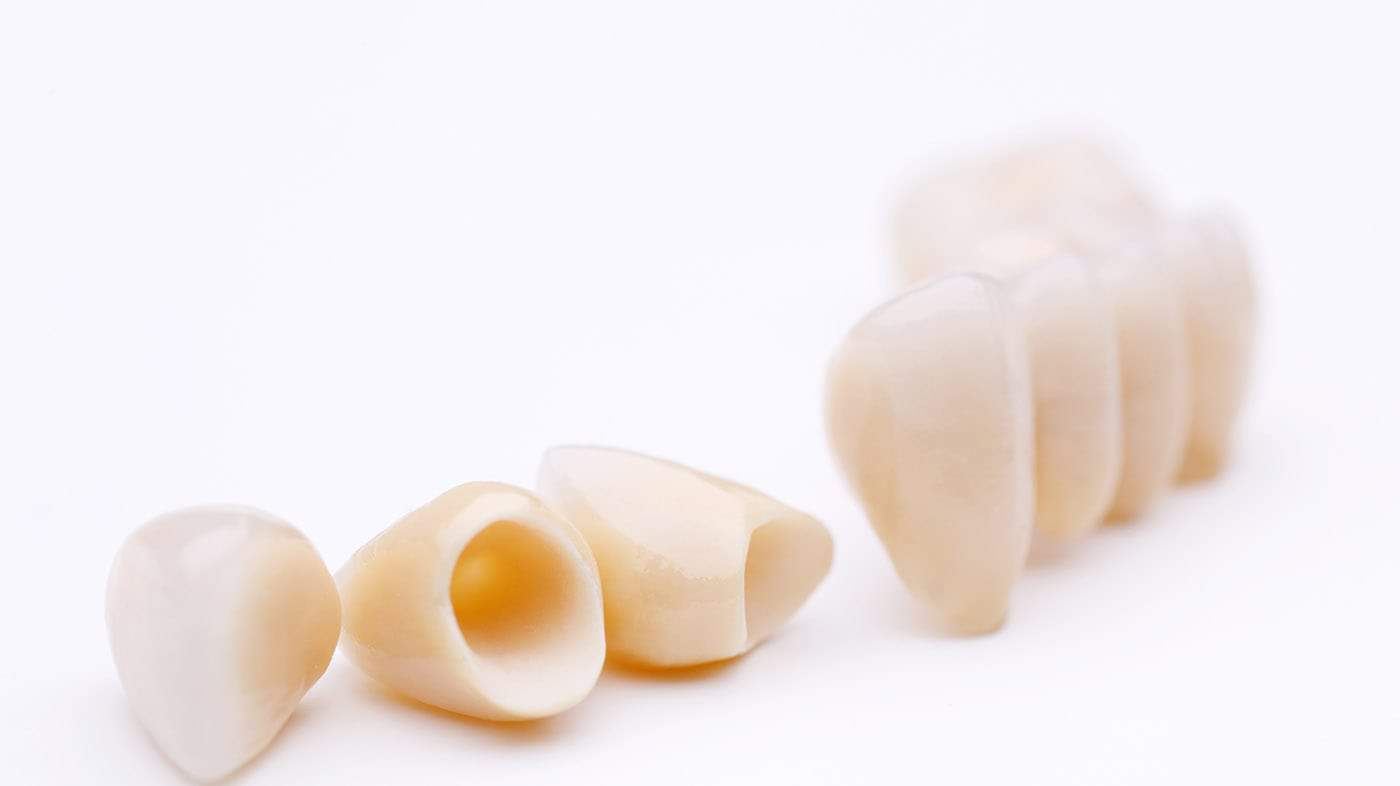Quick Links
- What Is A Dental Crown Treatment
- Dental Crown Procedure Explained
- Next Steps
- Dental Crown Placement Appointment
- How Much Should A Crown Cost?
- How Long Do Dental Crowns Last
- What Are The Best Types Of Dental Crowns?
- What Are The Different Types Of Crowns?
- What Type Of Dental Crown Is More Durable?
- Is It Painful To Have A Dental Crown Put On Your Tooth?
- What Crown Is Best For Back Teeth?
- What Are Dental Crown Treatment Alternatives?
.
.
.
Everything You Need To Know About Dental Crown Treatments
For Tulsa Dental Center Patients

In this complete guide to dental crown treatments, we talk about the different types of dental crowns, the cost of a dental crown, the most durable types of dental crowns and explain how much a dental crown can cost, along with the alternatives to getting a dental crown procedure.
If you have a question about dental crown treatments, you will find out everything you need to know before booking a dental crown appointment here at Tulsa Dental Center.
If you’re considering getting a dental crown treatment, you’ll probably have a few questions about the different types of crowns that are available to choose from, along with wanting to know about the dental crown procedure, what are the costs involved in dental crowns, and what to expect with a dental crown procedure. In this complete guide to dental crown treatments, we seek to answer all the questions you might, and tell you everything you need to know before booking an appointment to get a dental crown in Tulsa.
What Is a Dental Crown Treatment?
When your tooth is damaged or needs replacing entirely, you might be told you need to get a dental crown treatment. Essentially, this is a type of restorative covering which can cover part of an already damaged tooth, or it can cover the entirety of a tooth. Another instance when getting a dental crown treatment is appropriate, could be when you have a perfectly healthy tooth, but it just doesn’t have a good cosmetic appearance; whether it be the shape, color or size that is particularly displeasing, getting a dental crown procedure can help give you a tooth that looks better.
If a tooth has undergone prolonged treatment, perhaps because of a root canal or a deep-rooted decay, a filling may not be the best course of action to ensure a long-lasting result. In such a case, you might be told that getting a dental treatment with crowns or veneers is a better course of action.
After a root canal treatment, your Dentist could advise you to get a type of dental crown covering in order to ensure the tooth remains fully protected, and to enable the most longevity from the tooth that remains.
There are lots of types of dental crown treatments that can be customized to suit your individual needs. Once in place, it will look and feel just like a natural tooth, so that when you eat or chew, it performs and feels perfectly normal. By placing a dental crown over any gapped, discolored or crooked teeth, it will instantly improve the appearance of the tooth.
The Dental Crown Procedure Explained
It’s perfectly normal to want to understand exactly how a dental crown treatment works, and in this section, we will talk you through what’s involved in the dental crown procedure.
Getting a permanent dental crown will typically involve at least two appointments with your Tulsa Dentist. On the first visit to the practice, you can expect to have x-rays taken of the underpinning root structure, along with the tooth. This is an essential first step in the dental crown process as it ensures a completely accurate assessment can be taken in order to validate that the strength of the tooth that will remain is adequate for dental crown placement. If you have a tooth that is particularly damaged or decayed, then your Dentist could advise getting a root canal treatment before your crown is placed.
Even if you are only getting a dental crown for the cosmetic benefits, your Dentist will still need to take the same series of x-rays in order to verify and document the procedure.
At this same first appointment, your Dentist will discuss the different types of materials for a dental crown, along with giving you a full breakdown of dental crown costs. Together, you will be able to establish which is the best type of dental crown to use for your individual circumstances and needs. Another key factor for consideration will be the location of the potential crown. For instance, if you are looking to find out the best type of crown for front teeth, you could be presented with different options than if you want to find out which is the right type of crown for the back teeth.
The placement will also dictate the visibility of the crown, along with knowing which type of dental crown is most durable; all of these are factors which will be discussed with your Dentist at your first Tulsa dental crown appointment.
When you are ready for your dental crown procedure to take place, you can expect to receive a local anaesthetic prior to any work being carried out. However, it is not always required, for instance, if you have had a root canal treatment already carried out.
Next Steps
In the first instance, the tooth will be fully prepared by getting rid of any decay or damage. The tooth may then need to be filed on the outermost surface to ensure the crown can be placed securely. If there is only a smaller segment of the original tooth, a specialist filling material could be utilized in order to rebuild the base of the tooth. This is important as it helps to hold the crown in place.
Once the preparation has been completed, your dentist will take some impressions of your teeth, using a specialist type of mold or putty. In some instances, digital scans will also be taken. The impressions do not just solely focus on the tooth in question; they will also need to account for the surrounding teeth along with the gums, as well as those which lie on the opposite bite surface. This again is an integral step in the dental crown treatment process as it ensures your new crown will enable you to bite normally.
These impressions and/digital scans are then sent off to a specialist dental laboratory, who will then prepare and create the dental crown to be completely customized to fit in your mouth. This process of the dental crown fabrication can take a few weeks, and this is why you are unable to have a same-day dental crown treatment.
In between your first and secondary dental crown appointments, your Dentist might recommend that you get a temporary crown fitting in order to safeguard the underlying tooth. A temporary dental crown could be made using either a resin or acrylic based material, and it is typically fixed to the tooth using a type of dental cement. It is perfectly normal to expect to feel a little sensitivity between your appointments. However, your Dentist will be able to advise exactly what to expect from your dental crown treatment and suggest options to help you manage any sensitivity that may occur.

Dental Crown Placement Appointment
Once your customized dental crown and bridge has been fully prepared and fabricated, it will then be sent straight to your Dentist in Tulsa. This is when you can expect the appointment for a dental crown placement to be arranged.
If a temporary crown was used, this will be the first thing to be removed on the day. They will need to confirm that your new crown fits properly, and also that you are happy with how it fits and how it looks.
When you come back to get your dental crown fitted, your Dentist could also use a mild anaesthetic for the procedure. The surface of your natural tooth will need to be prepared again, and a specialist dental cement will be used to help achieve a comfortable and secure fitting.
How Much Should A Dental Crown Cost?
The cost of your dental crown will depend on the type of material you select for your dental crown, it will also depend on the work that needs to be done, and the complexity of the fitting.
A basic metal crown is the cheapest type of dental crown available. If the crown is to be constructed with other materials, such as ceramic, gold or porcelain, then you can expect to pay more.
In almost all cases, there are payment plans available for dental crown treatments, and you can discuss these options with your Tulsa Dentist on your first consultation.
How Long Do Dental Crowns Last?
While it is possible for a dental crown to fall out or even just become loose, if you correctly maintain it, they can last for a lifetime. The best way to make a crown last is to ensure that you have a proper and correct oral health regime. Brushing, flossing, and using teepee’s at least twice a day is always the ideal way to ensure you are doing everything you can to ensure the longevity of a dental crown, and of course, to take care of your other teeth and gums.
What Are the Best types of dental crowns?
In order to establish the best type of dental crown, you need to consider where the dental crown is going to placed and also evaluate what specific strength of dental crown you might need. For instance, a dental crown that is highly-durable and less aesthetically appealing would be better suited for the back of the mouth; whereas a cosmetically beautiful dental crown would be a better option if you need a dental crown for the front of your mouth.
Budget is also important, and your Tulsa Dentist can talk you through the different costs of a dental crown treatment Vs. the best type of dental crown for your individual needs.
What Are the Different Types of Crowns?
Picking the best type of dental crown is a decision that should be made with your Dentist; they will be best placed to advice you on different options for dental crown treatments, and specifically, which type of dental crown is best for your individual needs. Here, we explain the different types of dental crown materials in detail to help you understand what your options are.
Each type of dental crown is made using different materials; some of these materials are fabricated to emulate the appearance of your natural teeth, while others might not blend in so well. In the case of the latter, these are typically used towards the back of the mouth, where appearance isn’t the foremost deciding factor. With modern advancements in dental crown treatment options, there are plenty of options for dental crowns to choose from, some of which mean there is no longer a need to compromise on durability Vs. cosmetic appeal. Below, we outline the three most popular types of dental crown treatments.
Metal Alloy Crowns and Metal Dental Crowns
There are lots of different types of metal dental crowns. These include a whole range of different materials such as Gold, Steel, Palladium, Nickel Chromium, Platinum or Cobalt Chromium. The motivating factor for choosing a metal dental crown is usually the added strength and durability they provide Vs. a porcelain crown. As can be expected, they are not as visually appealing as ceramic crowns. However, with modern dental crown products, there are many options that are both visually appealing and strong, meaning there no longer needs to be a compromise. In terms of the cost, Steel, Nickel, and Cobalt Chromium tend to be lower, and in certain cases, they provide a strong dental crown solution at an affordable cost.
Gold Crowns offer a very unique visual appeal when used on visible teeth, and they are also ideal where longevity is a factor. For patients that tend to grind their teeth or whom have a lower level of hygiene, this is still a popular choice of material.
Ceramic and Porcelain Crowns
Both of these types of dental crowns are very natural in their appearance and are suitable crowns for the front of the mouth or the back. There is a huge range of ceramic crowns that can be used, the best type of crown will depend on your specific dental practice and the laboratory they use to produce and fabricate the dental crowns.
Digital scanning has totally transformed the use of ceramics and porcelain dental crowns along with milling systems such as Cerac. Essentially, these enable a completely computerised method to make the dental crowns, which is different to the traditional firing methods that are made within a dental laboratory by technicians.
Porcelain is a specific type of ceramic that is typically used to achieve a natural looking crown. In terms of the strength, a porcelain crown is more suited for the anterior teeth.
Zirconia, Cerac, Emax, and Empress are four instances of very strong yet highly aesthetic materials that are used globally to make dental crowns. They are also suitable for placement in either the front or back of the mouth.
Porcelain Bonded Metal Crowns
This is a type of crown that is made with precious metal and comes with a coating or porcelain overlay to deliver additional durability and strength, while still having a very natural appearance. The outer layer of the dental crown is a type of porcelain which gets layered onto the metal base, helping to make the metal crown more visually appealing.
A porcelain bonded metal crown does have a slightly opaquer appearance. This is due to the fact that there is metal underneath and means that the crown can appear to be metallic or a little gray over time.
What Type Of Dental Crown Is More Durable?
In theory, the most durable type of dental crown is those which are a metal alloy or gold-based crowns. Additionally, metal alloy and gold dental crowns are highly wear-resistant, and they are also kinder to any opposing teeth. All-porcelain crowns are considered to be a little less durable and if the opposing surface becomes at all rough, this can tend to cause a little aggravation. With porcelain fused to metal crowns, these are a better solution in terms of strength than the all-porcelain types of dental crowns, and as mentioned earlier in this post, they can deliver a more visually appealing solution for those who are conscious about the appearance of the crown.
Is it Painful to Have a Dental Crown Put on Your Tooth?
When you book a dental crown appointment, the tooth which is being worked on will be completely numbed. This means that it will not present pain during the procedure. Usually, this is done a local anesthetic or a shot in the gums; neither of which generate any type of uncomfortable pain.
Once the dental crown treatment has taken place and the anesthetic wears off, there is usually a little sensitively that can be felt around the area. There may also be some slight soreness in the surrounding gums. The pain is minimal, and it does not last long.
What Crown is Best for Back Teeth?
If the visual appearance of the tooth isn’t a major factor, then a full metal crown is the best type of dental crown for the back teeth. It gets cast as a single piece and is very little chance for the metal crown to fracture or chip under the heavy wear.
If the appearance is important, then a zirconia crown or a porcelain fused to metal crown is going to be best option.
As with all dental crown treatments, your Dentist is best-placed to talk you through the options. What is opposing the crown, along with the forces to the crown will need to be considered when deciding which crown is best for your back teeth.
What Are Dental Crown Treatment Alternatives?
As with many things in Modern dentistry, there are usually always other options that you can consider if you are looking to understand what the alternatives are to getting a dental crown. Some of the potential options are listed below.
- A complete tooth extraction
- Build the tooth up with a filling
- Veneer or Pressable placement
- Onlays or near-crown equivalents
- Temporizing the tooth
It is important to note, that not all of these options are always going to apply to your individual circumstances. If for any reason, you are reluctant to get a dental crown, talk to your Dentist about what your options are.
Phone
Office Location
4824 S Union Ave,
Tulsa, OK 74107
Contact Information
Payment Methods:

Business Hours
| Monday | 8AM - 5PM |
| Tuesday | 8AM - 5PM |
| Wednesday | 8AM - 5PM |
| Thursday | 8AM - 5PM |
| Friday | Closed |
| Saturday | Closed |
| Sunday | Closed |


